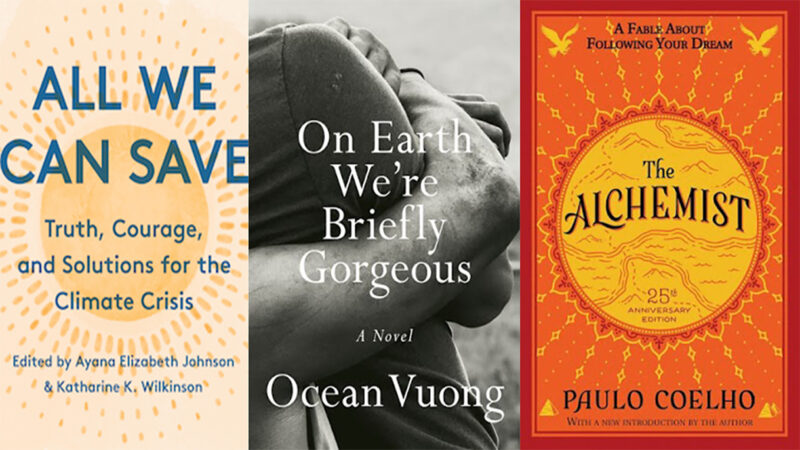
What they’re reading: 2020 Pritzker Genius Award book recommendations
One of our favorite Pritzker Award traditions is the book bar. Each candidate selects a book to share with attendees. At the 2020 ceremony, of course, our book bar was virtual. Here are the faves from our 2020 class, with notes from the candidates on why they chose the book they did.
Nikola Alexandre
Arts of Living on a Damaged Planet, by Anna Lowenhaupt Tsing
- “It grapples with the full complexity of our current environmental situation and stimulates conversations on how to live and thrive through this particular moment without falling into racist/reductionist tropes, greenwashing, or relying on false solutions.”
Dominique d’Emille Correia Gonçalves
Meu Pé de Laranja Lima (My Sweet Orange Tree), by José Mauro de Vasconcelos
- “This book takes you through real feelings of adventure, sadness and hope all endured by a young boy while growing up in a poor family in Brazil. I read this book when I was only 13 and I can never forget the feelings.”
Bailey Farren
The Structure of Scientific Revolutions, by Thomas Kuhn
- “As founders and activists, it is incumbent upon us to recognize and create new paradigms of thought and action. I love how Kuhn’s work teaches us to see the paradigmatic beliefs that shape how we think—training us to detect the anomalies that lead to a shift in that paradigm.”
Hal Holmes
The Lorax by Dr. Seuss
- ” ‘I speak for the trees.’ This was the first book that taught me about conservation and that we need to protect our natural resources.”
Kathy Jetñil-Kijiner
On Earth We’re Briefly Gorgeous, by Ocean Vuong
- “I read this book last year at a time when I was feeling untethered and uninspired. The writing and craft is so achingly beautiful and raw – it made me remember how powerful art can be and motivated me to continue creating.”
Rohit Kalyanpur
Sapiens, by Yuval Noah Harari
- “I enjoyed Sapiens because it provides a chronological framework to understand early human history and how our species evolved to what it is today.”
Clara Pratte
The Alchemist, by Paulo Coelho
- “The short read is always there ready to remind readers to follow their hearts and to see things from different perspectives. It is also a great reminder to enjoy the journey of life as being equal to or even more important than the destination. I find the book to be comforting and a constant something that can be read quickly and digested repeatedly to inspire and remind each of us that when we are driven to something greater it is destined to be if we are not dictated by fear.”
Gavin McIntyre
Cats’ Paws and Catapults: Mechanical Worlds of Nature and People, by Steven Vogel
- “Vogel’s book beautifully illustrates the natural wisdom and value of life’s devices. Many human inventions have had unintended consequences, and drawing inspiration from nature can help solve planetary-scale problems while limiting negative impact.”
Rose M. Mutiso
The Grid, by Gretchen Bakke
- “My favorite book about electricity.”
Desiree Narango
Braiding Sweetgrass, by Robin Kimmerer
- “Braiding Sweetgrass is an incredible book about indigenous knowledge and how identities intersect with nature, community and history. It’s an inspirational reminder of the gifts we receive from plants and what they can teach us about repairing our relationship with the land, and how necessary it is for our future.”
Leah Penniman
All We Can Save, edited by Dr. Ayana Elizabeth Johnson & Dr. Katharine K. Wilkinson
- “All We Can Save centers the voices of those most impacted by climate change as the solutionary experts. From a place of ecological humility and strategic genius the primarily women-of-color essayists and poets chart a course for climate healing.”
Shyla Raghav
The Third Plate: Field Notes on the Future of Food by Dan Barber
- “This book made me think about our relationship with food — and how we, as humans, are integrally linked with the ecosystems in which we live and through which we are sustained. We hear a lot about eating and purchasing locally, and this book helped me understand the importance of redefining food for ourselves and our communities for our health and for reducing our footprint on this planet.”
Sami Tellatin
Ishmael by Daniel Quinn
- “I appreciate Quinn’s imaginative exploration of alternative perspectives on modern history and humanity’s tendency towards growth.”
